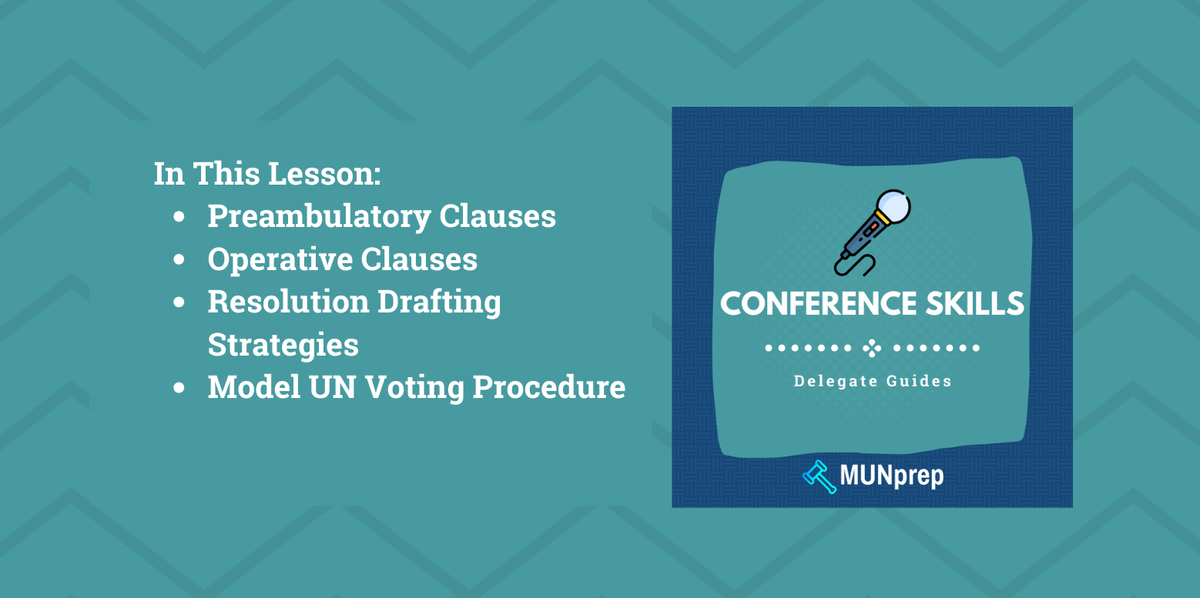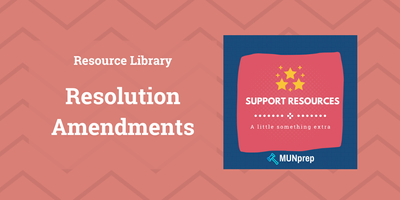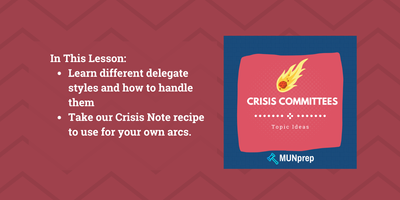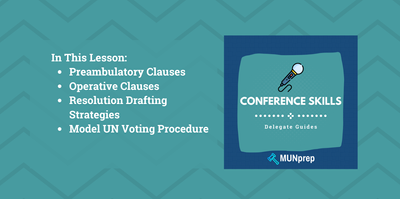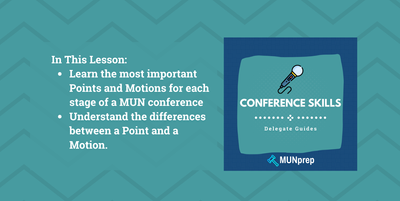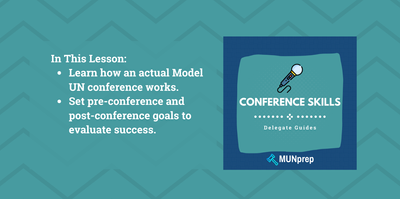Unmoderated Caucuses - Mastering MUN Negotiation
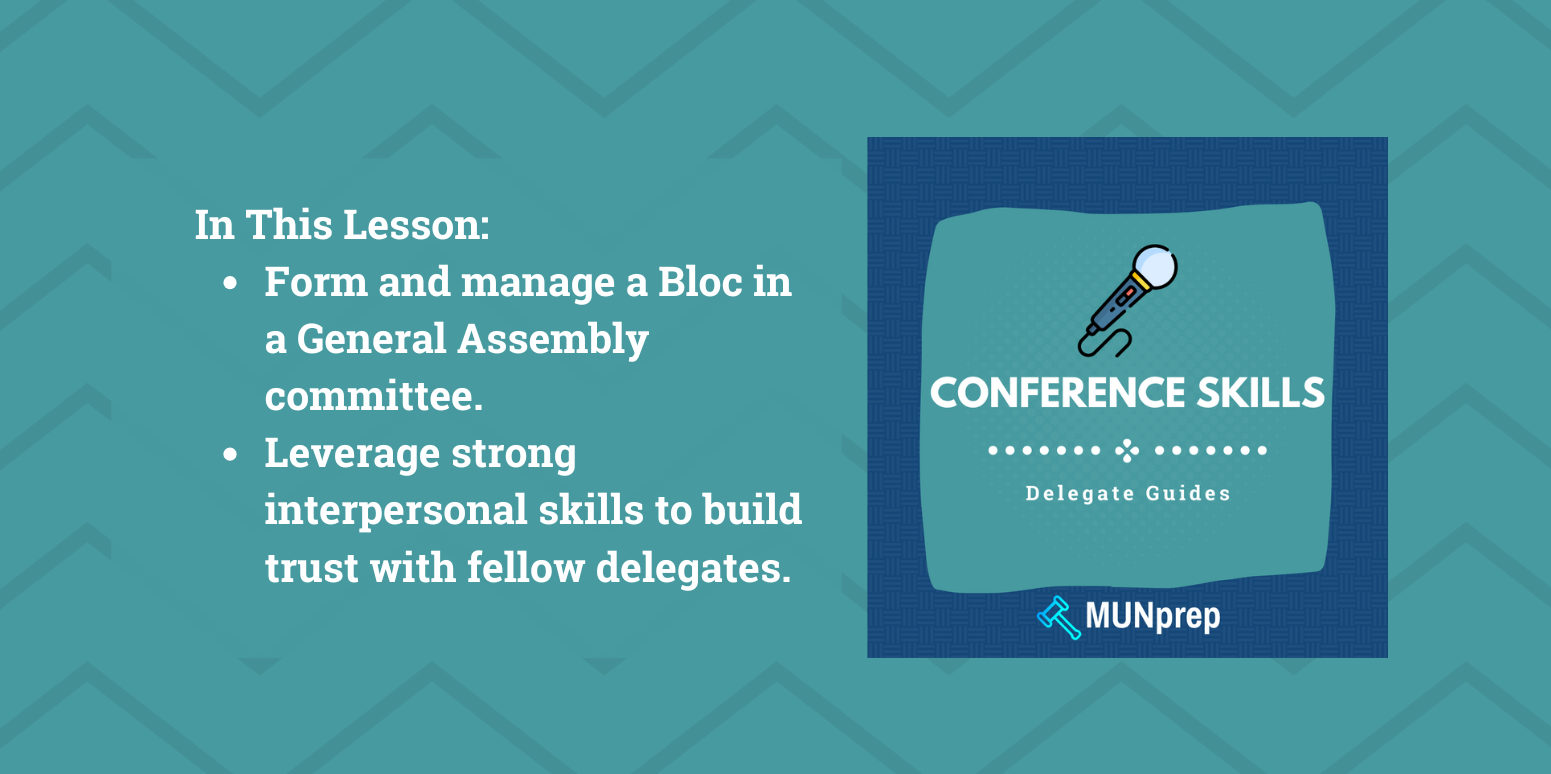
In Regular style committees, Bloc management is essential to the committee process. A Bloc is set up early on and puts in place a team of delegates that you will be working with over the course of the weekend.
Strong interpersonal skills will make or break your Model UN conference success. In this lesson, we’re going to go over some of the essentials of Committee dynamics and help you to navigate your way effectively through your next committee session.
Bloc Management - General Assemblies
In this guide, we're focusing mainly on bloc management for GA committees, this is because they are much more permanent than what you might find in Crisis committees, and will largely work in the same way whether your committee has 60 people or 200.
Today, we'll teach you everything you need to know about:
- Bloc Building
- Caucusing
- Delegate management
We will help you through the foundational skills of tackling a General Assembly committee and all of the aspects that you need to know for your next committee experience.
What is a Bloc?
A Bloc is a group of delegates who are all working together on the same resolution. They have similar ideas and believe that they can make a coherent working document together.
Blocs are generally formed during the first few unmoderated caucuses of a conference weekend.
The Unmoderated caucus is key
An Unmoderated caucus is a time where debate is not structured by the chair and provides a more open conversation. It’s a particularly valuable time to work with your bloc on your working paper.
The nature of your Unmoderated Caucuses will change throughout the weekend. At the start, there will be a lot of bloc building and working on your paper. However, towards the end, it will be more focused on merging and fine-tuning your paper for presentation and Q&A.
In your committee there are a few different activities done in the out-room or in Unmoderated Caucuses.
- Bloc building
- Bloc merging
- Resolution writing
- Networking and managing bloc dynamics
- Discussions and voting on Q&A and Presentation
The dynamic of your bloc will change throughout the weekend as people get to know each other better. You want to make sure that you are still leading the bloc at the end of the weekend and that your continued effort is recognized through your Resolution document and your speeches.
During an Unmoderated Caucus you want to make sure you and your key partner are working to support each other during voting and merges.
The First Unmoderated Caucus - Starting Strong
Bloc-building can begin before the first unmoderated caucus—sometimes this can be through just passing notes or echoing ideas during speeches. Nevertheless, the real momentum toward forming a bloc usually takes off once delegates enter their first unmoderated caucus.
The goal of the first unmoderated caucus is to start building your bloc - a team of like-minded delegates. To get to this point, you'll want to use the notes and insights gathered in the earlier part of the conference.
You should already have a sense of which delegations you would like to work with, who have compelling ideas, and how the rest of the committee is shaping up. This background knowledge becomes invaluable now, as you apply it to forge or expand your bloc.
Keeping the Momentum Going
As you find like-minded people, you'll start to piece a team together. At that point, you'll want to make sure you can stay in contact with everyone.
Here are a few things you can do:
- Make a List of Countries - It is easy to lose track of who is in your bloc during the excitement of the first unmoderated caucus. Keep a written list of country names so that note-passing is more efficient and the distribution of tasks (such as drafting clauses) is clearer.
- Come Up with a Bloc Name - A recognizable bloc name is more important than many delegates realize. It allows your bloc to stand out during moderated debate and helps the committee differentiate one group’s position from another. Branding is key in every aspect of Model UN.
- Send Notes After the Unmod - Continue to solidify your coalition once the unmoderated caucus ends. Send a quick message to your team thanking them for their collaboration and suggesting a future meeting time. If you’re working on drafts or proposals outside of formal session, agree on a specific place and time—an hour before committee starts is a popular choice. Communicate these details in a group chat so you can include as many bloc members as possible and keep everyone aligned.
How to Make a Bloc
When building a bloc, look at three major factors:
- Countries
- People
- Objectives
While it's important to collaborate with countries that naturally align with the nation you are representing and to find people whose core objectives match yours, prioritizing a strong relationship is key.
You will be spending the entire weekend intensively working with your bloc on a resolution, so it's crucial to ensure you enjoy and trust the people you are collaborating with. Building a bloc with individuals you like and enjoy working with will lead to a more productive and pleasant experience.
By considering these factors, you can effectively navigate your first committee session and form a strong, cohesive bloc.
First Impressions matter
First impressions are everything in Model UN because they can affect your success throughout the conference. If you start off well, it can lead to good teamwork and strong alliances. But if you get a bad reputation at the start, it's hard to change that in just three days. So, make sure your first interactions are positive.
Be polite, listen carefully, and show that you understand your country's position. By being prepared and friendly, you can build a strong foundation for your bloc right from the beginning.
To build a good reputation the most important thing is to show that you are a team player. You want delegates to know that if they cooperate with you:
- They will be supported
- Their ideas will be included in your resolution
For this reason, at the start of your conference – your goal is to show delegates how well their ideas work with your own.
Check out our guide on Note-passing here!
Finding your key partner
The most important part of leading a bloc is finding your Key Partner. They’re someone who will have your back throughout the weekend and you will have theirs. Whether you are in a double delegate pairing or a single delegate, finding a partner, or pair of partners for the weekend is essential. You work together and make sure you’re leading the bloc as a team. A good leader does not work alone.
What to look for in a Teammate
After the first session is really when you solidify your team. You won't be able to work with everyone you want to so you have to decide who you are most interested in working with and who are the most logical choices. Make sure you prioritize collaborating with delegates who:
- Will be a strong teammate, and;
- Who you trust.
More importantly, you don’t want to choose someone who runs the risk of undermining you later on in the conference.
Here are a few ways someone can undermine you in Model UN:
- Removing You from the Sponsors List: A teammate could push you off the sponsors list, taking credit for your work and reducing your influence.
- Changing Agreed-Upon Clauses: They might alter or remove key clauses you worked on without your consent.
- Not Supporting Your Proposals: They might not support your proposals during voting or discussions, weakening your position.
Leading a Bloc
There are many ways to lead a bloc and be diplomatic. However, there are many more ways not to lead a bloc. To lead a bloc you need to understand the balance of being a good leader, delegate, and friend.
The Leader
When the Chair is present, guide the discussion without dominating it. Effective leaders understand that controlling the conversation doesn’t mean always speaking but rather ensuring productive discourse.
Present your ideas, then invite others to share theirs. Positivity and inclusion build trust and foster collaboration. Delegate tasks and incorporate suggestions from others so everyone feels involved.
Example Phrases to Highlight
“I think you, Ghana, had an interesting point to add.”
“Canada made a great point about refugee camps in their opening speech.”
The Delegate
Offer to refine clauses and welcome feedback. This shows respect for others’ input and strengthens group cohesion. Once your ideas are included in the resolution, you become a valuable part of the bloc’s progress.
Beyond leadership and relationship-building, ensure you are a well-informed delegate. Thorough knowledge of your country's stance, the topic at hand, and your proposed solutions is essential for effective bloc leadership. Solid research underpins your ability to lead discussions and negotiate effectively.
The Friend
When the Chair steps away, adopt a more casual tone. Ask about your peers’ Model UN experiences or school life. Personal conversations build camaraderie and lay the foundation for a supportive, trusting team.
By striking the right balance among these three roles, you’ll effectively lead your bloc and create a positive environment for everyone involved.
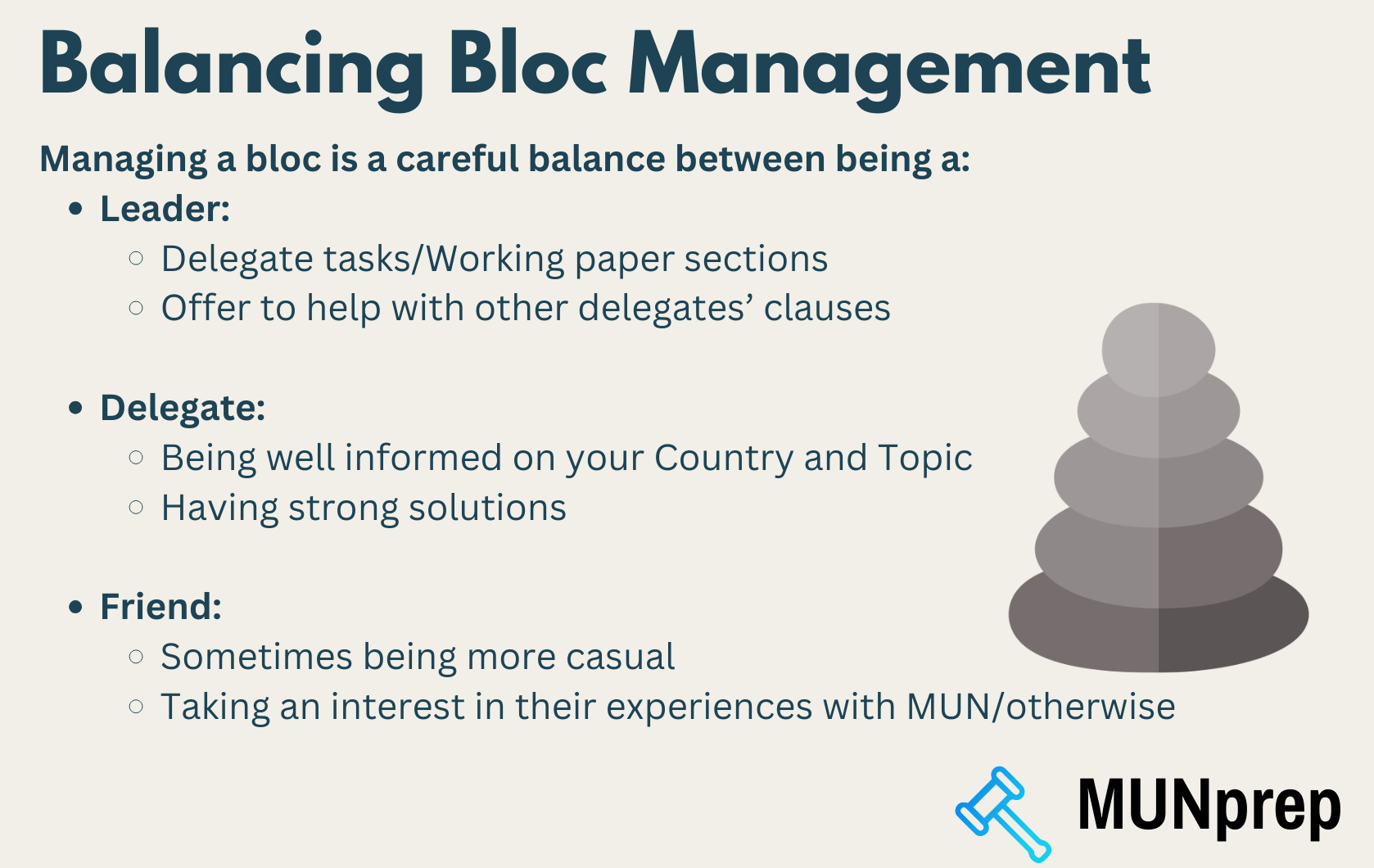

Different ways to bring value to your bloc
The most important way you can remain as a sponsor on a resolution is by bringing value to your team. Here are a few techniques that you can use.
- The Framework Approach:
- Develop a comprehensive framework that accommodates that serves as the overall skeleton for the resolution. Have other delegates integrate their proposals within this framework.
- The Cornerstone Approach:
- Take charge of critical aspects of the resolution, such as funding or logistics, to maintain influence over its direction.
- The Coalition Approach:
- Act as a bridge between two blocs and manage the merge process. Facilitate communication and collaboration to ensure a smooth integration of ideas.
- Detail-Oriented Approach:
- Provide thorough, in-depth clauses that enhance the resolution's credibility and completeness.
- Strategic Planner:
- Proactively gather necessary signatories for your resolution. Prepare an elevator pitch and effectively communicate the benefits of your proposal to garner support.
By adopting these approaches, you can ensure your contributions remain central to the merged resolution while demonstrating effective leadership and collaboration skills.
Some key factors to remember about bloc building
Unlike in Crisis Committees, a General Assembly will always require teamwork in order for you to succeed. There is no way to lone-wolf a GA committee. Here are a few tips for better teamwork and etiquette in your next committee!
- Sit with your bloc during mods
- Do not talk while others are giving speeches
- Get bloc members to mention your country/clause in a speech and you do the same
- Clap/snap when your bloc members give speeches
- Send notes to other bloc leaders you want to merge with
- Always remain respectful and diplomatic with other blocs, you never know when you might need to merge with them
Final reminders
General Assembly out-room is quite different from Crisis, as you do need to remain diplomatic with all nations; it is challenging, if not impossible, to play the antagonist in a GA committee and succeed.
Here are a few key takeaways for your next Unmoderated Caucus.
- Remain friendly
- Do not steamroll people when they are talking – actually, listen and collaborate
- Chat to other bloc leaders throughout the weekend and know who you want to work with
- Make sure you’re on the same page as your key partner
- Know when to lead and when to be a friend.
Up next, we're covering Resolution writing! We'll show you everything you need to know on how you and your bloc can piece together an awesome working paper.
